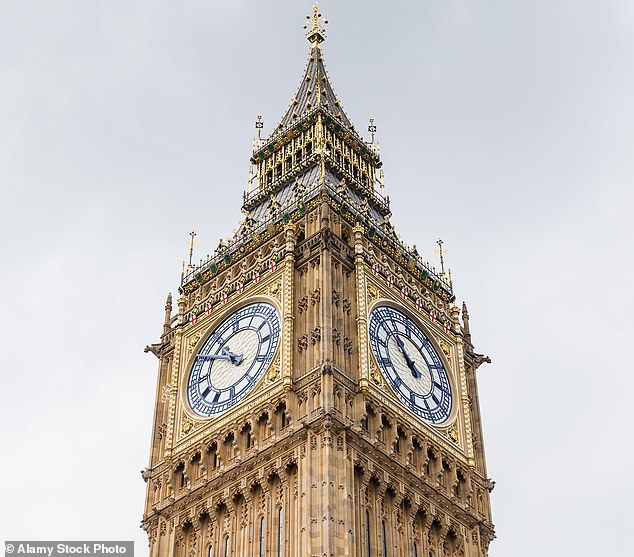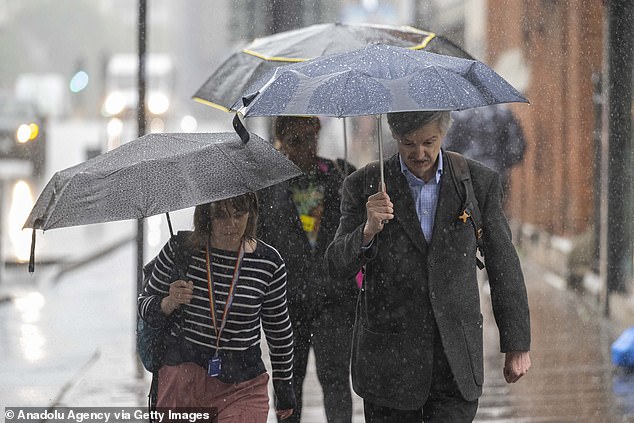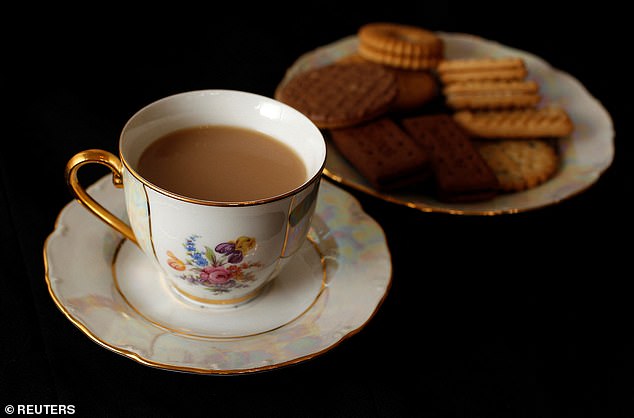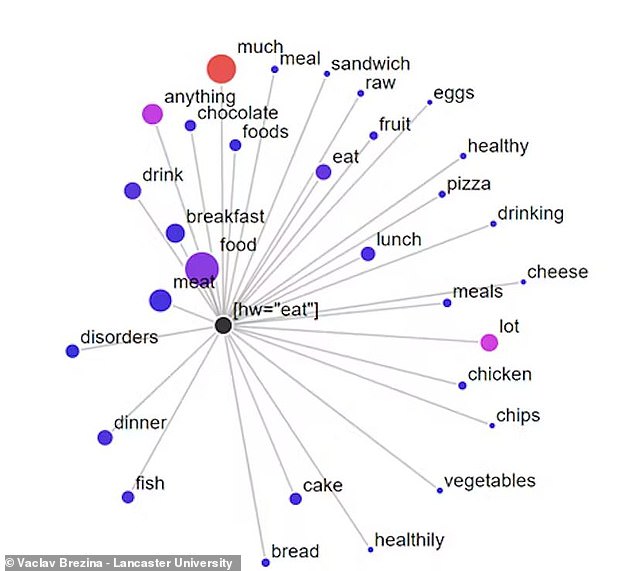Tea, the weather and being on time: scientists analyze 100 million words to reveal what Brits talk about most
The idea that we constantly talk about tea and the weather is perhaps one of the oldest stereotypes about British people.
But now scientists have confirmed that this caricature is actually based on reality.
Linguists from Lancaster University analyzed 100 million words to reveal what Britain is really talking about.
Unsurprisingly, words like ‘the’, ‘and’, ‘to’, ‘of’ and ‘an’ topped the list.
However, the team also found that some of the most commonly used words in the English language refer to time and punctuality, food and drink, the weather, emotions and our bodies.
Scientists have revealed that Britain’s favorite topics of conversation are time and punctuality, food and drink, emotions, the weather and our bodies
To understand how words are used, Professor Vaclav Brezina and his colleagues analyzed every word in the 2014 British National Corpus.
This is a comprehensive sample of current language use, covering informal speeches, fiction, newspapers, magazines, academic writing and other sources.
Writing in a blog for The conversationProfessor Brezina said: ‘The way someone talks and the words he or she uses tell us a lot about where someone comes from, their social background and even their age.
‘Language reflects and shapes society. As a linguist it is my job to find out how.’
From their analysis of hundreds of thousands of unique words, the researchers identified five key themes in British speech and the words that define them.
Time and punctuality
One of the most talked about topics in Britain is time and lateness.
This subject is so important to the British that ‘year’ and ‘time’ are the two most commonly used nouns in British English.

One of the most talked about topics in Britain is time and lateness. This subject is so important to the British that ‘year’ and ‘time’ are the two most commonly used nouns in British English
‘Year’ occurs 1,963 times per million words, while ‘time’ occurs 1,983 times per million.
This doesn’t even include the phrases “on time” or “on time,” which occur together at a frequency of 47 times per million words.
An analysis of individual tense words also reveals Britain’s preferences for certain topics.
For example, ‘summer’ is much more popular than ‘winter’, occurring 144 times per million, compared to just 63.
Sunday and Saturday are the most popular days of the week to speak, with 114 and 104 words per million respectively.
December, meanwhile, is the most popular month with 149 times per million, followed by March and May with 145 times and 142 times per million respectively.
Weather
There’s nothing Britons love to talk about more than the weather.
One study suggested that the average Brit will spend four months of their life complaining about the weather.
This is no surprise, since we spend an estimated eight hours a week thinking about the weather.

Professor Brezina’s analysis showed that the word ‘weather’ occurs with a frequency of 60 times per million words
Professor Brezina’s analysis showed that the word ‘weather’ occurs with a frequency of 60 times per million words.
And in an indication of how the weather determines our plans, he discovered that it usually appears next to the words ‘pub’ and ‘restaurant’.
When it comes to our favorite weather topics, it’s perhaps no surprise that sun and rain are the two biggest concerns.
The word ‘sun’ occurred with a frequency of 91 times per million, while rain occurred 51 times per million as a noun and 15 times per million as a verb.
Storms, clouds and snow also dominate our conversations with frequencies of 32, 39 and 37 times per million words respectively.
Professor Brezina also found that the use of climate-related words, such as ‘climate change’ and ’emissions’, increased by 21 percent between 2010-2015 and 2016-2020.

It seems that Brits prefer to talk about good weather, as ‘sun’ was used more often than ‘rain’, ‘storms’, ‘clouds’ or ‘snow’
Food and drink
When it comes to our food and drink, the humble cup of tea reigns supreme.
According to data from Professor Brezina and his colleagues, the word ‘cuppa’ occurs 231 times per million and ‘tea’ 92 times per million.
Coffee, meanwhile, occurs only 73 times per million, while ‘champagne’ is six times less common than tea.
Other commonly mentioned drinks include wine, beer, milk and juice.
And when it comes to food, the analysis reveals some interesting trends about Britain’s eating habits.
Dinner appears to be the most popular meal in Britain, at 68 times per million words.
This means it is ahead of lunch 51 times per million and only 43 times ahead of breakfast.
Professor Brezina also revealed that Brits have a bit of a sweet tooth, with cake being talked about three times more often than salad.

Tea was one of the drinks most commonly referred to by the British, being six times as common as ‘champagne’ (stock image)

Professor Brezina created this diagram to show how words are used with the verb ‘eat’. The closer a word is to ‘food’ in the center, the stronger the association between the two, while the larger the circle, the more often these words appear together
Emotions
Britain may be home to the ‘stiff upper lip’, but researchers have revealed that we actually talk about our emotions quite often.
And despite its reputation for being gloomy, analysis revealed that ‘happy’ is actually the emotional word Britons speak most often, at 208 times per million words.
However, Professor Brezina points out that it is often used to express satisfaction in terms such as ‘I’m quite happy to stay at home’.
When it comes to words expressing negative emotions, Britain once again remains true to its stereotypes as ‘sorry’ is the most commonly used word.
Often used to apologize or politely decline something, this word is used at a frequency of 204 times per million.
Our bodies
According to the researchers, Brits also spend quite a bit of time talking about their bodies.
In particular, we seem particularly interested in the use of the words ‘hand’, ‘head’, ‘eye’, ‘foot’ and ‘heart’.
The researchers suggest that the popularity of these phrases may also be due to how often they appear in metaphors or other common phrases.
For example, “Hand,” which has a frequency of 530 times per million words, can appear in phrases such as “lend a hand” or “helping hand.”
Meanwhile, “head,” which occurs 435 times per million words, can be used as a job title, just like “head of sales.”
Professor Brezina added: ‘Expressions such as ‘on the one hand’, ‘in the public eye’, ‘putting a foot on the ground’ and ‘breaking someone’s heart’ are all examples of how our bodily experience of the world is present in ordinary language . as we use it every day.’
